
|   |

|   |
Experimental Theatre: A promise and hope - Padma Jayaraj e-mail: padmajayaraj@gmail.com Photos courtesy: Abhimanyu V May 8, 2014 Janabheri, the voice of the people, based in Thrissur, Kerala, presented its National Theatre Festival for the second year. Five days of theatre fest showcased dramas directed by theatre persons under forty. “These directors who have made their marks on the national scene are the new generation whose voices make you a compulsive observer,” said Prof. Ramanujam, the doyen of theatre, in his inaugural address. Eight plays cutting across regions and languages showed the diversity that is the hallmark of India. Theatre persons from Kerala are inclined to the experimental genre. KALO SUNAKHARI 
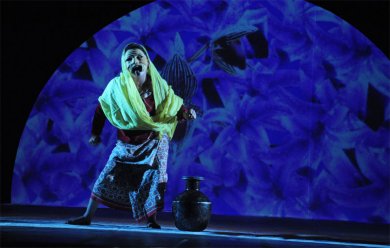
Well-known director Abhilash Pillai brought ‘Kalo Sunakhari’ from Sikkim. His production done with the students of the outreach center in Sikkim as a visiting faculty of the National School of Drama, Delhi, showcased the land and its people in an innovative way. As a multimedia production, the play explores the possibilities of physical theatre as a performance language. Set against a terrain of steep heights and sharp falls, here, the people are prone to a life of physicality. Their body language is exploited to replace dialogue. Masque-acting, mime and stylized body movements are the measures that universalize the theme. The dome-shaped lighted screen displays the pictures of his photo shoot to create a special ambience: the landscape, locale, and cultural and aesthetic nuances of Sikkim. As the audience pours into the auditorium, the large lighted backdrop on the stage with a larger than life sized seated Buddha illumines the hall. And as the audience settles down, the screen shows the vista of the Himalayan region filled with orchids, its many shapes and colors creating sensuality, close-ups of orchids hinting at sexuality. It is remarkable use of lighted backdrop. Against the vastness of mountain terrain, Sikkim perched on the Himalayas and Kanchenjunga looming in the distance is the perfect place for the narration of the life of a woman. During the ‘Meet the director’ session, Abhilash Pillai spoke on the inspirations that made the play. When he reached there he could sense the constraint for open ground. Moving through the ups and downs of pathways made the people physically agile. Although their clothes spoke of modernity, their tribal traditions formed the bedrock of their values. Predominantly Buddhist, Christianity seems to have ushered in changes and modernity. However the culture shock that he received was the practice of polygamy. Hence the drama revolves around the love a woman has for two men, rather than the love of two men for a woman, based on the novel ‘Sonam’ by Yeshi Dorjee Thongchi, a distinguished writer from North East. Sonam is the central character around whose love and life the rhythms of village life punctuate. Her life: marital life with two men, becoming a mother, failing health, prolonged illness and finally death, is narrated without language. Beyond this nucleus we find a sister who takes care of the children. The village with its animals and humans paint the canvass. The burden of life moves on a low key: household chores, a river nearby, hunters, shepherds and travelers among dogs, yaks, horses and snow leopards. The snow clad mountains crisscrossed with evergreens witness the drama of human life: love, quarrels, imparting justice, caught in its folds. Music with regional flavor adds its dimension to life in the mountains. The actors of Repertory Company, a team from North-East, speak of their culture through this play to the mainstream in India. Human values are eternal even when ethnicity is so different. As the play progressed without an introduction, I felt the theme to be love and deception. Polygamy is far from my mind. Of course it was practiced until recently in different ways among many communities. Women dying during child birth were too common. It checked the division of landed property in an agrarian community. It bound members of families together. The sociological reason why it prevails in Sikkim, despite the role of Christian church is a surprise. If the director had given an introduction before the play, I could have concentrated on the nuances of the woman managing two husbands even when she has preference for one. As an experimental physical theatre the gift from Sikkim was something to cherish. THE MOMENT JUST BEFORE DEATH  The director Liju Krishna is a postgraduate student of the School of Drama, Kerala. His play was selected for the 9th Mahindra Excellence in Theatre Award and bagged two awards including six nominations. Manoj Omen who won the Best Actor award is the lone character in the play that represents an old man in his seventies yearning to die. In stark darkness under beams of light, the shards of memory flit past, for a moment just before his death. It is a bleak picture: of desolate motherless, lonely childhood and poverty. Loving memories of his father, a toddy tapper who used to feed him with sweet toddy is appealing. One day his father dies in an accident leaving him an orphan. The sorrows of an orphan are poignantly enacted. And ever since, his only refuge Muthapan, the ancestor god, deepens the tragic dimension. In his youth, he pours his heart unto Muthappan; he grows flowers for sale, because he loves flower plants. Many who frequent a cemetery buy flowers from him. Among them is a motherless, poor girl who wants flowers, but could not afford them. She is like him, alone and poor. Love blossoms in his youthful heart. But his joy does not last. She too passes before him in a coffin. Bereft of joy and hope he prepares himself for death, the only gate of deliverance for him. Years of waiting on the threshold of death is depicted as a prolonged curse. He makes and paints his coffin; keeps the one good shirt, trousers and a pair of shoes intact, for the final journey. And waits, waits with flowers ready. One is reminded of the immortal Cybil of Greek myth who hangs herself yearning to die. Here of course death finally comes. He prepares his body with the sanctity of rituals associated with the ceremony of death. Dressed, taking his flowers he climbs into the coffin. That death is a deliverance from a loveless life is the theme of the play. What can one hope for at the end of a hopeless life? That many cursed by loneliness, bypassed by life, who endure the passing days in a wasteland is an eye-opener to those inebriated by the fits of life. The director highlights not just hapless old age, but the tragedy of the marginalized evaded by life and its passions. Liju Krishna won the award for best stage design. Lighting creates a magical realism supported by music, especially the Hindi film songs of his youth. Lighting is used to focus the centre piece, the old man and his coffin. A flickering light at the shrine for his god and his hut in the shadows beyond the pathway is the world of the old man. Like a black and white movie, the setting and the actor move on to dramatize a tragic tale in utter slowness. MACBETH RETOLD 

April 22 saw two versions of the Shakespearean play, Macbeth. In a rare attempt, Dr Ettumanoor P Kannan presented the western classic in Cholliyattam. Cholliyattam is Kathakali performance without its costume. Cholliyattam is expected to enact the varied nuances of meanings of words and lines of a lyric with accent on bhava abhinaya, using appropriate hand gestures .Since Macbeth is a play of action, it is challenging for a Kathakali artist. Therefore, the performer has chosen the theme of Macbeth as a story of crime and punishment highlighting the internal drama that happens in the mind of Macbeth, the temptations leading to the crime and its retribution in the mental plane. More than the portrayal of the Western classic it is impressive as a universal theme. The costume represents an Indian classical performance with suggested associations of a negative character. The loud percussion instrument chenda, aptly creates the explosive mood of the character. Textual verses transformed to suit the Malayalam cultural perceptions merge with abhinaya. But narration of English passages from the original for a background for performance refused to gel. In ‘Meet the director’ session, Kannan narrated how he tried to create the play during a visit to America. Before an English speaking audience it must have created a sense of surprise. In Kerala, the Kathakali fans have a habit of appreciation rooted in tradition. It is like setting an English lyric in one of the Carnatic ragas. But as an experiment, the attempt is laudable. MACBETH, a Malayalam adaptation produced by Abhinaya Theatre, directed by M.G. Jyothish was selected for Mahindra Excellence in Theatre and won 4 awards. The director takes liberties with the text to make it a contemporary theatrical production. 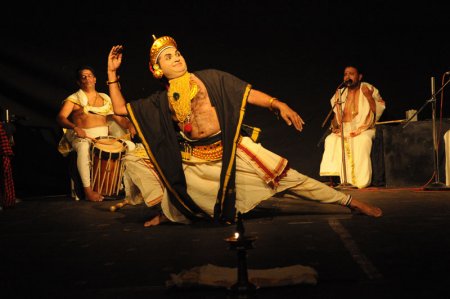
Macbeth Cholliyattam
The story unravels through the perspective of three characters: Macbeth, Lady Macbeth and Banquo. It is created as a surrealistic play focusing on the mental planes. Lighting and mirrors are effectively used to create the inner world of mind where dark passions dominate. The broken images in the moving mirrors where the red splashes the violence of the theme reveal the illusionary world of the power hungry. The director starts the play from the middle where Macbeth and Lady Macbeth are at the threshold of their fall, the weakness of the human being of which they were not aware when they plotted the murder. And then the story is captured in retrospect using chorus, stylized body movements, and stage props. The director takes liberties with the text assigning all the evil plots to Lady Macbeth and Macbeth as the victim of her dark fantasies which gives a symbolic dimension to the play. The play ends with Banquo’s lineages on the throne, where Man is defeated by Destiny. A powerful treatment of the theme of violence and its retribution is relevant to our brutal world. A visually powerful play against apt music and sound, it leaves its mark on students of Shakespeare who studied Macbeth from different angles. PENALITY KICK 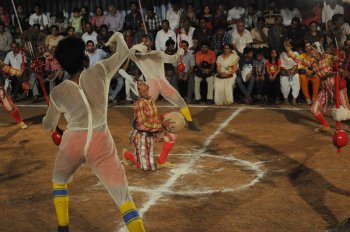 ‘Higuita’ is a surrealistic short story in Malayalam written by the renowned writer N.S. Madhavan. Rene Higuita, the Columbian soccer player is known for breaking conventional rules while at the goal post. In the story, Higuita is the metaphor for Father Geevergese, a priest in Delhi who saves Lucy Mandy, a tribal girl, from Jabbar, a pimp and bully. Aliyar of Athlete Kaika Natakavedi, Palghat, gives a credible dramatic version of the story as a slice of life in modern democratic India. The football court is the theatre ground and all the actors, both men and women, are football players. Jabbar who befriends the mother of Lucy Mandy succeeds in taking the poverty stricken Lucy to Delhi promising her a job. Delhi is a microcosm for India. Power grabbing and revolts go hand in hand. Here, although Lucy is a maidservant, she has to yield to men for money, as Jabbar is a pimp. She seeks the help of the priest. But with all good wishes the priest can hand only the cross to her. The grand church music creates an irony for the people who fail in life. The story is given in songs and in snatches of conversations as the players play soccer, the announcers blaring ‘no goal.’ The game is a series of penalty kicks. Thus life is pictured as a soccer play at many levels: Lucy is the ball kicked in different directions by men in the beginning; we are the players who lose every time; we are the goalies betrayed by our own team. The finale is an interesting twist to the original story which gives a message to contemporary India, where the Delhi incidents resonate in the light of violence against women. Here Lucy is the heroine. That she has to play the game is the lesson she learns. She learns the trick of the game. Hence, it is her team who could finally gain from the penalty kick. But in spite of her triumph all the players are caged by the umpire which gives starkness to the end. KALEIDOSCOPE 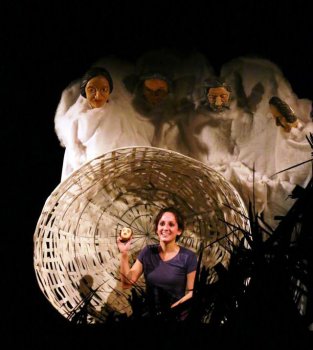
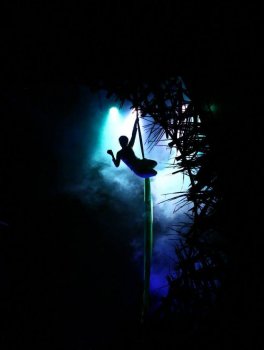
The director Jose Koshy is an acclaimed lighting designer and multimedia expert. As the title suggests the play is a string of assorted pictures. It evokes the wonder of a child who sees the designs at the other end of a kaleidoscope. Some of the pictures from collective memory resonate with individual angst, reading experience, or fantasies; some do not. But each picture is a powerful entity although disconnected. The wonder of a night sky through a telescope, the boat that carries a lost man to an unknown shore, the lonely old man surrounded by his collection of books, unable to read, the woman who has to leave her childhood home to make her own home elsewhere…Here lighting rises to the level of fine arts. Lighting and designs create abstract art. Lighting is simply stunning against apt musical score. The play is an experiment very much like abstract painting that leaves the viewer to decipher his/her own sense of experience. Founded in 2004, Janabheri is a cultural organization, based in Thrissur. It focuses on contemporary theatre and classical art forms of Kerala. Festival director Abhimanyu Vinayakumar is such an enthusiast that the unit has taken Malayalam plays to international theatre festivals. That experimental theatre as a genre is trying to find a language of its own is a welcome sign in an era dominated by cinema. Padma Jayaraj is a freelance writer on the arts and travel. She is a regular contributor to www.narthaki.com |